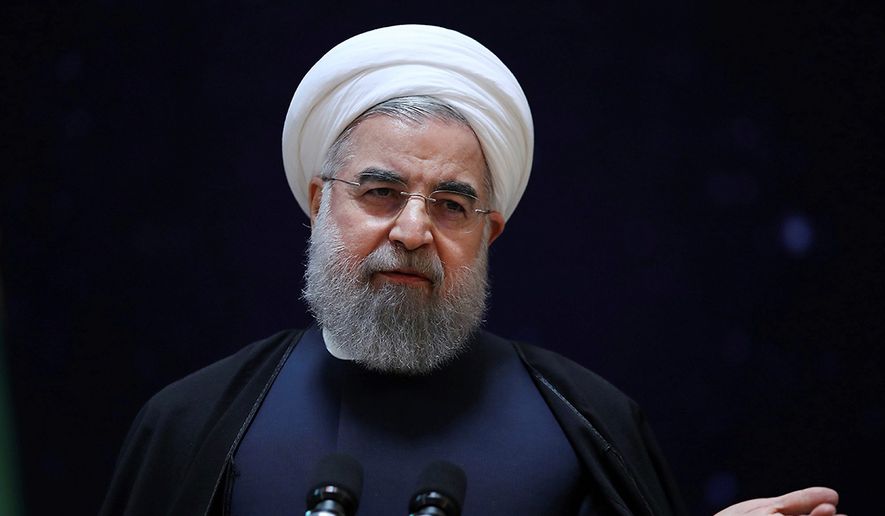The White House sent a stern warning Wednesday to Iran that the administration would not let its hostile acts go unchallenged, as President Trump tried his hand at saber-rattling for the first time since taking office.
The tough talk — including the threat that Mr. Trump’s national security team wasn’t taking any options off the table — came days after an Iranian missile test and a deadly attack by Tehran-backed Houthi militants on a Saudi naval vessel in the Red Sea near Yemen.
If Tehran was testing the new president, the White House attempted to show that Mr. Trump was not only ready for it but also more willing than the previous administration to tempt conflict.
“As of today, we are officially putting Iran on notice,” National Security Adviser Michael Flynn said at the daily White House press briefing.
The message, delivered by Mr. Flynn in front of TV cameras and by top national security aides at a briefing with reporters, was simple: Tehran had better get in line — or else.
The surreal warning came from the White House rather than from the State Department, which typically handles diplomatic gestures, to underscore the importance Mr. Trump has placed on the issue, said a senior administration official.
SEE ALSO: Donald Trump: Iran was ‘ready to collapse’ before nuclear deal
While the posturing could be expected to thrill Mr. Trump’s base, it was just as likely to raise alarm for critics who fear he will needlessly start a war.
Adding to Mr. Flynn’s remarks, White House press secretary Sean Spicer said the administration was “making sure that they understood that we weren’t going to sit by and not act on those actions.”
During the election campaign, Mr. Trump railed against what he described as the Obama administration’s weak and ineffective dealing with Iran, including a pact intended to dissuade Tehran from developing nuclear weapons and a deal in which the U.S. gave the country $1.7 billion in cash in exchange for hostages.
Mr. Trump had vowed to tear up the nuclear deal, but officials at the White House said they were addressing Iran’s destabilizing activities separately from the nuclear issue.
Declining to specify what actions the U.S. was prepared to take to retaliate against Iran, the officials said several options were being considered and that a “deliberative process” was under way.
Earlier, at a meeting with supporters of his nomination of Neil Gorsuch to the Supreme Court, Mr. Trump gave a glimpse of his reaction to the threats brewing around the world and what he inherited from Mr. Obama.
“We have problems that are a lot bigger than people understood. I was left something with a lot of problems,” he said, adding that he would “straighten them out very strongly.”
Mr. Flynn also blamed the previous administration. He said Mr. Obama’s policies encouraged Iran’s belligerent behavior, which included the ballistic missile test that violated a U.N. resolution prohibiting Tehran from testing missiles capable of delivering nuclear warheads.
“The Obama administration failed to respond adequately to Tehran’s malign actions, including weapons transfers, support for terrorism and other violations of international norms,” he said. “The Trump administration condemns such actions by Iran that undermine security, prosperity and stability throughout and beyond the Middle East which places American lives at risk.”
The United Nations has not identified the ballistic missile test as a violation. Tehran insists that it does not possess nuclear weapons and therefore the prohibition does not apply to the missile test.
The Trump administration argued that a ballistic missile is obviously a warhead-delivery system. “It’s inherent in physics,” said a top adviser.
The 2015 nuclear deal between Iran and six world powers stipulated that Iran would abide by an eight-year extension of the U.N. ban on ballistic missile development, a move backed by the U.N. Security Council.
Since signing the deal, however, Iran has repeatedly defied the prohibition.
Iranian Defense Minister Gen. Hossein Dehghan acknowledged the latest test but declared that “we will not let any foreigner meddle with our defense issues.”
After being briefed by Mr. Flynn, Senate Foreign Relations Committee Chairman Bob Corker, Tennessee Republican, praised the administration’s resolve.
“I am very encouraged by the seriousness with which President Trump is approaching the full range of threats Iran poses to American interests,” he said. “It is clear that Iran will no longer be given a pass and will be held accountable for its illicit behavior.”
Capitol Hill Republicans, most of whom opposed the nuclear deal with Iran, had clamored for a tougher stance throughout the Obama administration.
They have introduced bills in both chambers that would place more sanctions on Tehran, replacing sanctions removed under the nuclear deal and punching the country for its support of terrorist and other actions that threaten their neighbors in the Middle East.
“Iran has made a mockery of the international community with its missile program, support for terrorism and human rights abuses,” said Rep. Peter J. Roskam, Illinois Republican and a co-sponsor of the sanctions bill introduced Wednesday in the House.
“The United States will no longer stand idly by and allow the mullahs to flout international law and threaten the peaceful coexistence of nations with its reckless, belligerent behavior,” he said.
• S.A. Miller can be reached at smiller@washingtontimes.com.




Please read our comment policy before commenting.